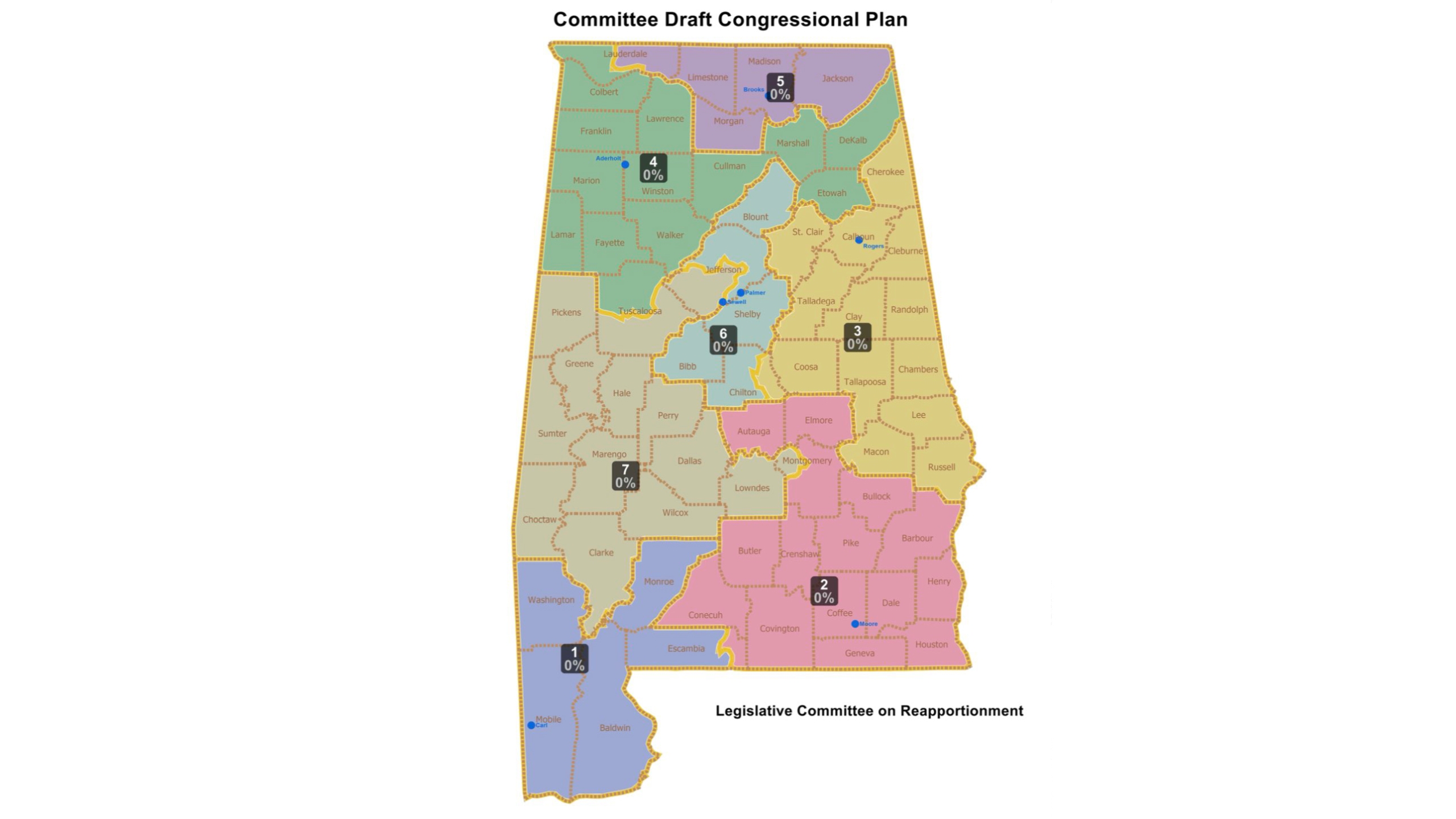Alabama coalition partners are speaking out against the redistricting maps approved by the state Legislature Wednesday. They raised concerns about what they see as a lack of transparency, accessibility, accountability and failure to pass fair maps during the redistricting process.
“(Wednesday’s) passage of new district maps for Alabama has been a disappointment from start to finish – from a lack of accessibility during the public hearings in September to the failure of legislators to rely on experts who could help advise them on drawing constitutional and Voting Rights Act-compliant districts, to the lack of transparency during the special session where legislators were voting on maps they hadn’t even seen before,” said JaTaune Bosby, executive director of ACLU Alabama. “This elected body had an opportunity to address the historic injustices that have led to decades of diluting Black voting power, and instead chose a path where they sought to use race to maintain power.”
Many grassroots organizations have been working during the redistricting process to explain the process to voters and hold lawmakers accountable. Coalition members have been concerned, along with Democratic lawmakers, about the lack of racial polarization study data they say the Legislature needed to analyze the maps adequately.
“Prior to approving the four voting district maps signed into law by our Governor, our state officials did not study patterns of racially polarized voting,” said Evan Milligan, executive director of Alabama Forward. “These studies are well established within the field of redistricting and would have helped us understand how voting maps can unfairly advantage or disadvantage candidates running for public office. This information is even more critical for those who want Alabama to emerge from the anti-civil rights shadow of the state’s past. Failing to acknowledge the value of this information, the majority of our officials chose maps that dilute the voting strength of the very cultural communities responsible for our state’s population growth over the last ten years. In fact, the growth of these communities prevented our state from losing one of our seven congressional seats.”
League of Women Voters Alabama President Kathy Jones noted the hastiness in the Legislature to make a decision that affects Alabamians for the next decade.
“In less than a week, Alabama’s Legislature passed bills to define the state House, Senate, Congressional, and Board of Education voting district maps for the next ten years,” Jones said. “These maps were delivered by the reapportionment committee’s lawyers only a day before the reapportionment committee met on Tuesday, Oct. 26. The detailed maps were never reviewed by the Alabama legislators, and efforts to make amendments to address concerns were repeatedly rebuffed by the reapportionment committee chairs. Alabama deserves better than this rush to pass maps created by out-of-state political operatives who do not work in the best interest of Alabama citizens and communities. Alabama deserves fair maps that respect communities of interests and actually respect and protect the voices of each and every voter.”
Kathryn Sadasivan, redistricting counsel for NAACP’s Legal Defense Fund, said the maps deny Black Alabamians a chance to elect candidates of their choice.
“The maps passed by the Alabama legislature and signed into law by Alabama Gov. Kay Ivey today explicitly deny Black Alabamians the opportunity to elect candidates of their choice in Congress and the state legislature,” Sadasivan said. “This is a monumental and intentional failure by both the Legislature and Governor, who refused to conduct the analysis required to comply with the Voting Rights Act and represents yet another direct attempt by Alabama officials to dilute Black voting power. Silencing the voices of Black people fails all Alabamians because it robs the entire state of the opportunity to have a truly representative government that prioritizes the concerns of its communities.”
This was the first redistricting cycle where Section 5 of the Voting Rights Act, which required pre-clearance, was not in place as a security measure to give more accountability to the Legislature.
“This special session’s efforts to deny a voice to voters will invite costly legal challenges that taxpayers will foot the bill for,” said Jack Genberg, senior staff attorney for Southern Poverty Law Center. “Once again, Alabama has shown that federal protections like the ones in the John R. Lewis Voting Rights Advancement Act are needed to ensure these maps are reviewed to ensure they do not harm voters of color before they are implemented.”
The congressional map is already being challenged for diluting the voting power of the state’s Black communities in violation of Section 2 of the Voting Rights Act by a group of individual voter-plaintiffs with the support of the National Redistricting Foundation. The lawsuit, Caster v. Merrill, was filed in the U.S. District Court for the Middle District of Alabama.
“The state Legislature and Gov. Ivey are refusing to protect the people that they were elected to serve, and they leave us no choice but to support a challenge to this discriminatory map that diminishes the voice of Alabama’s black communities,” said Marina Jenkins, NRF Director of Litigation and Policy. “This map is the outcome of a redistricting process run by self-interested politicians only focused on maintaining power, at the expense of fair representation. Alabama’s black voices must be heard, and they deserve maps that reflect their voting power in the state.”
Between 2010 and 2020, Alabama’s Black population grew while the white population fell. According to the 2020 Census, Black Alabamians now compose more than 27 percent of the state’s population.
The complaint alleges that the new congressional plan cracks Black voters in Alabama between several congressional districts, despite the fact that the Black population is sufficiently numerous and geographically compact to form a majority of the voting-age population in a second congressional district. Plaintiffs in the case are asking the court to declare that the new map violates Section 2 of the Voting Rights Act and to order the enactment of a new congressional plan that includes two majority-Black congressional districts.




















































